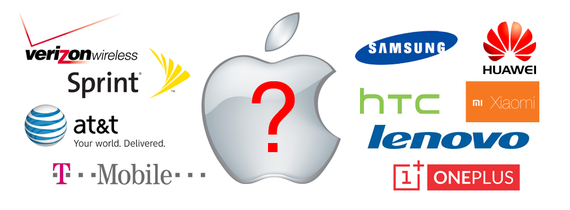It's hard to imagine that Apple's stunning profit report from last week is anything but good news, but i'm going to go out on a limb and say that what we've just witnessed is the beginning of the end of Apple. Ok you say, that's a pretty bleak way to look at good news -- but hear me out.
First, the facts of the Apple quarterly results; Apple finally gave China what it wanted, big phones -- and that resulted in a 70 percent rise in China sales. Wow -- that's a big market to crack. Apple sold 74.5 million iPhones and revenue jumped to $74.6 billion from $57.6 billion the previous year... a $17 billion increase.
Ok, so now let's talk profit. Apple crushed world records with an $18 billion dollar profit, giving it a massive $178 billion cash reserve. What's not to like about this situation if you're either an Apple owner or stockholder?
I'd say -- plenty.
Apple's profits are based on the fact that it makes a huge margin on its iPhone, and carriers have subsidized the phone to land, or retain, customers. But now the major carriers are shifting away from long term contracts and subsidized phones -- and for the first time customers are facing sticker shock at just what a new iPhone is going to cost them in cold hard cash.
Historically, iPhone prices have stood at $199 for a new-gen entry-level phone on a two-year contract. Not cheap, but not out of the reach of most customers.
But the real cost of the phone is buried in the fine print of two-year deals with the major carriers -- as ZDNet reported after it crunched the numbers. Without a contract, the 16gb iPhone 6 costs $650. At AT&T T +0.96 percent, a two year contract for that same phone will cost you between $560 and $800, at Sprint between $680 and $920, and Verizon between $470 and $830 dollars. This doesn't include the onerous and often ignored "activation" fee of $30 to $40 a phone, since most users can negotiate this out of their deal if they push back a bit.
ll those scary numbers used to be hidden -- but now they've come out as the carriers start to give consumers choices and price comparisons to other devices. AT&T Next is described as a "bring your own, pay full price, or month-to-month" plan. But there's no subsidy for the hardware.
New plans like Verizon Edge and AT&T Next are bringing the pain of Apple's super-premium device pricing out from behind the discounted curtain.For example, with Verizon Edge you pay monthly installments of $750 (the full price of the phone).
The real dark cloud on the smartphone horizon are the Chinese manufactures like Xiaomi,, Lenovo , OnePlus and Huawei who are driving down prices the market with Samsung comparable Android devices at lower price points.
And so the question is -- for average customers who need a new phone, when faced with Apple's cost, will they remain loyal users? An IHS tear-down report says that the iPhone 6 costs Apple $200.10 to make, and sells in the us for $649, a profit margin of 69 percent. If you want to know where the billions of dollars in quarterly profits come from, it's clear that margin on the iPhone is the source.
So, with the love affair with carriers on the wane, what can Apple do to build new businesses with similarly strong margins? The Apple watch, the new toy on the horizon, seems unlikely to be a widely adopted 'must have' device in the way the iPhone is today.
On the other hand, the light at the end of the tunnel may be Apple Pay. If Tim Cook and his team can move quickly enough, there's one version of the story that sees the price of the iPhone move down to meet the market, as revenues on electronic banking transactions rise to fill the gap. But to do that, Apple needs to start to eat the lunch of the incumbent credit providers and transaction processors -- and there's no doubt they're going to hand over the consumer relationships without a fight.
So -- while this quarter's massive Apple profits are impressive, Apple isn't going to be able to keep up that pace without some pretty complex and inherently risky maneuvers.
Apple fans, get ready for a rough ride.

